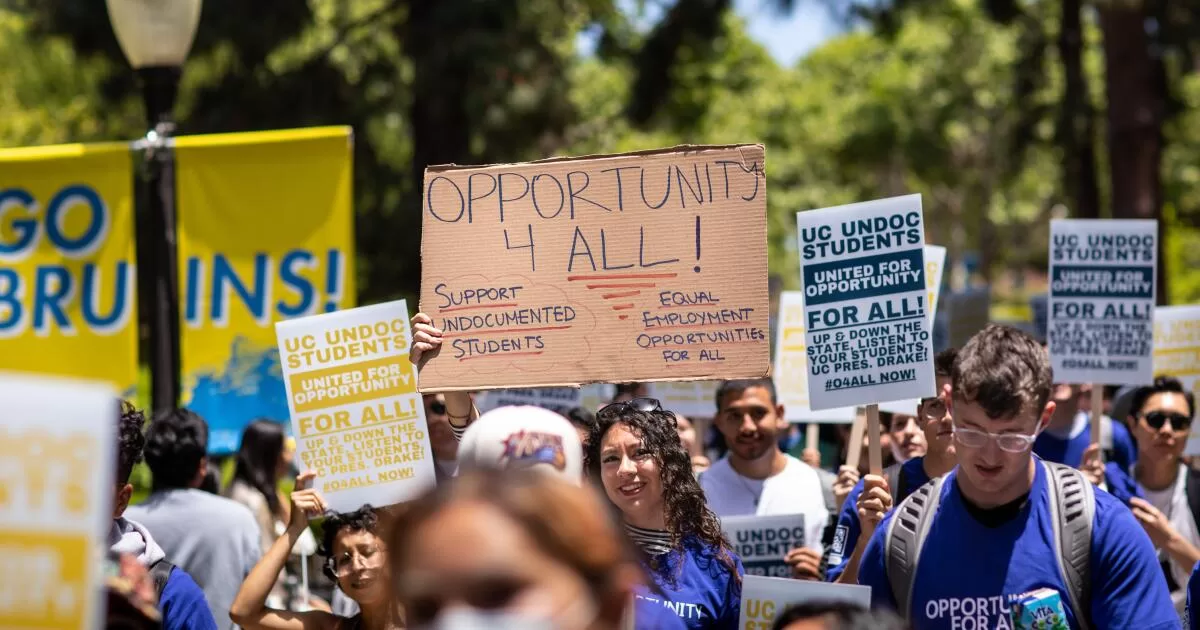Has California reached its limit in providing benefits for immigrants living here illegally? That’s the indication after Gov. Gavin Newsom vetoed three bills passed by the liberal Legislature.
The state at least has definitely hit an election-year pause.
Newsom says publicly he blocked the closely-watched measures for good policy reasons. And those reasons were sound.
But it was also good politics for him in the long run, and more immediately for California Democratic ally Kamala Harris.
The vice president is already carrying a heavy load of leftist California baggage as she runs for the top job. The “San Francisco liberal” doesn’t need an added burden heaped on by her home state.
“Kamala Rolls Out Red Carpet for Illegals,” was the banner on one Donald Trump campaign piece last week.
Harris has been trying to thread the needle, running as a moderate focused on attracting middle America while keeping her progressive base intact.
While Trump claims she’s responsible for out-of-control illegal immigration — as if a vice president is responsible for much of anything — Harris has been promising to toughen border security and restrict entry.
Newsom’s chief communications advisor, Bob Salladay, denies that the governor weighed political ramifications when vetoing the bills.
“The only political calculation is coming from the right wing in this country, which continues to demonize and cruelly attack undocumented people in California,” Salladay says.
But let’s be real. There’s no governor with national ambitions who doesn’t constantly gauge the political effect of his actions.
The supermajority Democratic Legislature passed all three bills by comfortable margins.
The most contentious, Assembly Bill 1840 by Assemblyman Joaquin Arambula (D-Fresno), would have allowed undocumented immigrants to apply — alongside other qualified people — for interest-free home loans of up to $150,000 if they’re first-time homebuyers.
“Those who pay [taxes] into the system should be able to receive benefits like everyone else,” Arambula contended during the Assembly floor debate.
Republican Assemblywoman Kate A. Sanchez of Trabuco Canyon countered that the bill would encourage “more illegal — not legal —immigration into this state. This isn’t rocket science. If you’re giving out free stuff, more people are going to come.”
In his veto message, Newsom injected a dose of realism cloaked in bureaucratic lingo: “Given the finite funding available … expanding program eligibility must be considered within the broader context of the annual state budget.”
Translation: This home loan program is broke and no additional money has been appropriated by the Legislature because the state is bleeding red ink.
So substantially, the measure was a lot to do about nothing.
Another proposal, Senate Bill 227 by Sen. Maria Elena Durazo (D-Los Angeles), would have paved the way for undocumented workers to receive unemployment benefits.
In rejecting the measure, the governor again asserted — as he has for years on bills costing money — that fiscal issues should be hammered out when he and the Legislature negotiate a state budget in June.
But the Legislature habitually tries to squeeze through more spending long after the annual budget has been enacted. Even when the state is running a deficit.
The third vetoed bill, AB 2586 by Assemblyman David Alvarez (D-San Diego), would have required the University of California, California State University and community colleges to hire undocumented students for campus jobs.
Newsom said he rejected the measure because it would have placed state employees at risk of violating federal laws against hiring undocumented students. He added that courts should address the issue. And a proponent of the bill almost immediately filed a lawsuit attempting to force a court ruling.
I called political consultant Mike Madrid and asked whether he thought Latino voters would be concerned about the governor vetoing bills aimed at benefiting undocumented immigrants. In short: Hardly.
“They’re increasingly going to be concerned with such bills,” Madrid replied. “They‘re going to be opposed.”
“Latinos have been telling us for years they want an economic agenda and an upward mobility agenda and neither party has addressed that. The parties want to talk about border issues — about walls and family separation — and that’s fine. But that deals with people who aren’t even citizens and can’t vote.”
Madrid is a Republican “Never Trumper” who believes the former president “is a unique threat to the Constitution and our country.”
He’s the author of a recently published book: “The Latino Century: How America’s Largest Minority is Transforming Democracy.”
“If Gavin signed those bills it would have been a slap in the face to Harris who has been trying to move the party away from the old way of thinking,” Madrid said.
“She’s moving the national party 180 degrees away from where California has been because Democrats have been losing Latino voters.”
“The Latino voter now is foundationally different than in the 1990s and 2000s — because they’re not recent migrants anymore,” the consultant continued. “Prop. 187 was 30 years ago. [Younger] Latino voters weren’t even alive during Prop. 187.”
That measure sought to deny public services — including schooling — to undocumented immigrants. The citizen initiative passed by a landslide but a federal court ruled it unconstitutional. The harsh anti-illegal immigration rhetoric, however, sparked strong Latino political activism in California.
But Latino citizens today, Madrid said, “are much more focused on economic issues and affordability. Lots of Democrats in Sacramento are acting like it’s still the 1990s. They need to address the serious economic problems of multi-generation Latinos that are here legally.”
It’s not like California isn’t helping undocumented immigrants. For starters, they’re entitled to Medi-Cal healthcare for the poor. Also, food assistance and college financial aid.
But Madrid’s right. Sacramento Democrats now should be doing more to help working class Latino citizens — and middle-class folks of all races and ethnicities.
